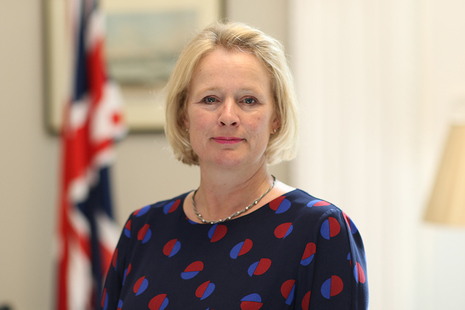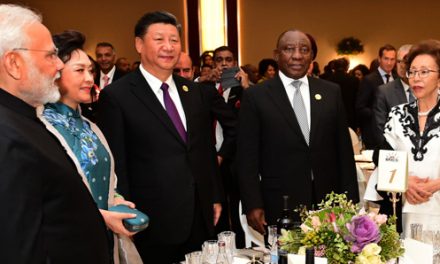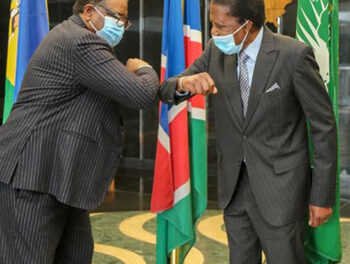
The UK is a committed partner to African nations on climate action

By Vicky Ford
UK Minister for Africa.
For communities living across Africa, climate change isn’t a future challenge – changing weather patterns are having catastrophic impacts for people living on the continent right now.
In South Sudan, flooding has affected over 600,000 people this year alone. In Northern Kenya, just one locust swarm was reported to contain up to 200 billion locusts, each capable of eating their own weight in food every single day. In 2019, Cyclone Idai tragically took the lives of 1,000 people and left 2.6 million people in need of shelter and food across Mozambique, Zimbabwe and Malawi.
The catalogue of climate disasters from across Africa goes on – Day Zero in Cape Town, extreme drought across the Sahel, the shrinking of Lake Malawi.
For African nations, the stakes couldn’t have been higher when world leaders gathered at the UN climate change conference this month.
This is why I am proud that, after two years of intensive global diplomacy, the historic climate agreement was reached at COP26 in Glasgow.
The Glasgow Climate Pact supports a just transition for developing countries, and for the first time agrees on a common timeframe and methodology for national commitments on emissions reductions.
And critically for African communities – particularly the women and girls who are most at risk of the impacts of climate change – governments of wealthier nations have committed to double the overall climate finance for adaptation.
The whole world played a role in reaching this deal.
154 countries and parties presented Nationally Determined Contributions, including many African nations who set out their own ambitious plans for reducing emissions.
At the Summit, South Africa signed a ground-breaking partnership with the UK, France, Germany, the US and the European Union to support the country’s just energy transition – the first of its kind worldwide. This will increase international support to help South Africa achieve its climate targets, and create green and quality jobs in communities that would be affected by these changes.
I applaud and congratulate this leadership – as COP negotiations show, these commitments aren’t easy.
We know that African nations are responsible for just 2-3% of global emissions and at COP26 the message came across loud and clear – the whole world needs to step up to the challenge.
And they did.
More than 130 countries signed up to a historic pledge covering over 90% of the world’s forest cover, to halt and reverse forest loss by 2030. This included at least $1.5 billion to protect the Congo Basin – traversing DRC, Gabon, Cameroon, Central African Republic, Republic of the Congo and Equatorial Guinea, and home to the world’s second-largest tropical rainforest.
In a significant step forward, more public and private finance were mobilised to support climate action in developing countries than ever before, with new pledges made at COP26 bringing us closer to meeting the $100bn annual climate finance target next year – and ensure we will exceed it after that.
High-quality green investment is a triple-win: supporting nations to achieve their climate commitments, creating economic growth and jobs, and helping communities adapt to changing weather patterns.
The UK is proud of our role in delivering reliable green investment. This includes the announcement at COP26 that we will be working with the African Development Bank, delivering ‘Room to Run’ – a new UK guarantee which is expected to unlock up to $2 billion worth of new financing for projects across the continent, half of which will help countries to adapt to the impacts of climate change.
This is just the beginning. We know the critical 1.5°C global warming goal only remains within reach if we keep our promises and translate commitments into rapid action.
We are leading the fight against climate change, including as a committed partner to African nations on climate action. Over the coming year of the UK’s COP Presidency, I look forward to working with partners from across Africa to deliver the commitments made at COP26.
These include the UK guarantee to the African Development Bank, but also the new UK backing for African-led plans to accelerate resilience-building across the continent, with support for the Africa Adaptation Acceleration Program.
And rolling out the UK’s new regional climate programme, which will operate across the continent, helping people to adapt to a changing climate, so communities and countries can thrive in an uncertain future.
Glasgow kept 1.5°C alive. But there is more work to be done ahead of the UN Climate Change Conference’s return next year, when COP27 will take place in Africa at Sharm El-Sheikh, Egypt.
So, we are rolling up our sleeves.
The UK will continue the work to mobilise private finance and green investment, to support the women and girls most at risk from changing climates, to boost adaptation and to better address the threat of loss and damage in climate-vulnerable countries.
Working together, for our planet, to deliver on the Glasgow Climate Pact.











































